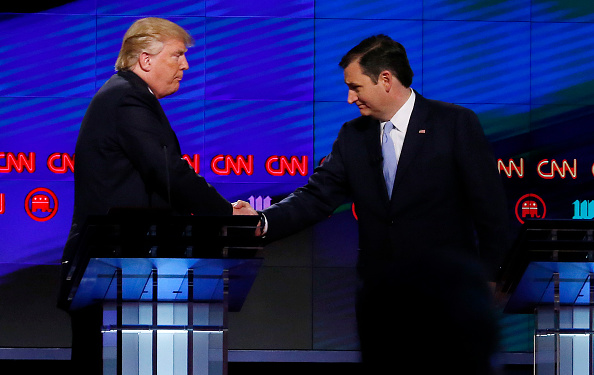
Saddled with two unpopular presidential frontrunners, the Republican Party may struggle to come together after a divisive primary no matter which candidate it chooses, according to the results of a new national survey.
The Washington Post/ABC News poll illustrates why both Donald Trump and Texas Sen. Ted Cruz project as weak general election candidates. A full two-thirds of U.S. voters have an unfavorable impression of Trump, compared to just 31% with a favorable view. Those figures make the New York businessman the most disliked “top-tier” presidential candidate in more than 30 years, according to ABC—trailing only former Ku Klux Klan grand wizard David Duke. More than half of respondents reported a “strongly unfavorable” view of Trump.
Cruz isn’t as widely disliked, but he’s still far from popular with the general public. Thirty-six percent of respondent said they had a favorable opinion of the freshman Texan, with 53% holding an unfavorable view. Among the three Republicans remaining in the party’s presidential primary, only Ohio Gov. John Kasich has escaped the bruising process relatively unscathed, with an even 39% split. Then again, Kasich is only viewed favorably by 47% of Republicans, a statistic that illustrates why he lags far behind his rivals in the GOP nominating contest.
Both Trump and Cruz are rated favorably by a solid majority of their own party, with Cruz’s 58% favorable rating among self-identified Republicans surveyed edging Trump’s 56%. Yet the two candidates’ dismal standing with political independents explains why Democrats would savor the prospect of facing either in November. About two-thirds of independents have an unfavorable opinion of Trump. Cruz is 25 points underwater with independents, with 56% reporting an unfavorable impression compared to 31% with a favorable one.
All of this is great news for Democratic frontrunner Hillary Clinton, who is not a broadly popular figure herself. (The last Post/ABC poll, conducted in March, pegged Clinton’s favorable rating at just 46%, compared to 52% unfavorable.) And it helps explains why many Republican operatives and donors see the general election as a near-lost cause, and are talking about diverting funds from the presidential race to shore up the standing of congressional candidates in tight races.
But while control of Congress is important, it will hard for GOP legislators to get anything done if its fractious factions can’t get along. That’s why the most notable figures in the poll may be the ones that underline the fissures in the party.
The source of Cruz’s support is a good example. Of the three remaining GOP candidates, he’s the one with the broadest base in the party, earning a +20 favorable rating from GOP respondents. But he’s still a sharply polarizing figure. While he’s +55 with self-identified “very conservative” Republicans, he’s just +7 among less conservative Republicans. Trump, in contrast, is underwater (-1) with “very conservative” Republicans, and +23 among their less conservative counterparts. According to the Post, “nearly 3 in 10 Republicans only have a favorable impression of Trump, disliking both Cruz and Kasich.”
Such statistics aren’t just a testament to Trump’s devoted following. They speak to the bitter split between the party’s blocs: the doctrinaire conservatives—largely evangelicals and Tea Party activists—who support Cruz, the mainline Republicans who see Kasich as their last hope and the disaffected whites who are the core of Trump’s fan base. If the party can’t coalesce once the primary is over, Republicans have bigger issues on their hands than losing an election in November.
The survey was conducted from April 6-10 among a random national sample of 1,010 adults, including users of both landline and cellular phones, according to the Post and ABC. It has a margin of error of plus or minus 3.5%.
More Must-Reads From TIME
- Dua Lipa Manifested All of This
- Exclusive: Google Workers Revolt Over $1.2 Billion Contract With Israel
- Stop Looking for Your Forever Home
- The Sympathizer Counters 50 Years of Hollywood Vietnam War Narratives
- The Bliss of Seeing the Eclipse From Cleveland
- Hormonal Birth Control Doesn’t Deserve Its Bad Reputation
- The Best TV Shows to Watch on Peacock
- Want Weekly Recs on What to Watch, Read, and More? Sign Up for Worth Your Time
Write to Alex Altman at alex_altman@timemagazine.com